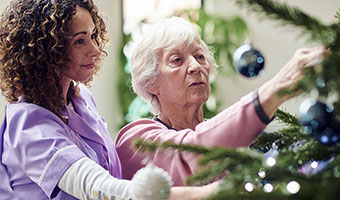Trapped: A Family Caregiver Shares His Story About Guilt for Wanting to Hire Home Care for His Wife
Martin “Marty” Schreiber faithfully cared for his wife Elaine — who has Alzheimer’s — for 11 years at home. The former Wisconsin governor and now passionate caregiver advocate wrote a book about his experience, My Two Elaines: Learning, Coping, and Surviving as an Alzheimer’s Caregiver.
As Elaine’s needs intensified, Schreiber struggled with feelings of guilt. Here, he shares the reasons many family caregivers feel this way, along with his tips for overcoming those feelings and communicating care needs effectively with other family members.
What About for Better or Worse?
Schreiber believes the marriage vows prohibit many family caregivers from getting help when they're caring for a spouse. "But if you really love your spouse, you need to help them with their current needs, not keep them in the past," he says. "If you don't, you deny them an opportunity in the present."
Schreiber also says you have to “join them in their world.” For Schreiber’s wife Elaine, her Alzheimer’s diagnosis changed everything. Alzheimer’s takes so much from the person living with the disease. It can steal moments of joy from the spousal caregiver too, says Schreiber. He had to meet her in her reality, and that also meant he needed support at home.
Caregivers Don’t Want to Admit Defeat
As a male caregiver, Schreiber struggled with pride about getting support. Men often don’t want to admit defeat, he says, but he learned that a real man understands the need for help — especially given the grim statistics around family caregivers preceding the care recipient in death.
Alzheimer’s caregivers are at an even higher risk: roughly 30 percent of caregivers die before their loved one, but a Stanford University study suggests 40 percent of Alzheimer’s caregivers die from stress-related disorders before their loved one.
"What a terrible irony to die before your care recipient," says Schreiber. That's why family caregivers should not equate getting help with admitting defeat. Partnering with a professional caregiver can alleviate the burden on the primary family caregiver and extend that caregiver's ability to provide care at home — where their loved one wants to be.
Caregivers Think They Can Do It Alone
Caregiving takes a village, but many family caregivers mistakenly think they can do it alone. Sometimes, opposition or lack of cooperation from siblings (links to family consensus article) can leave the primary caregiver feeling as if they'd be better off doing all the work themselves. But carrying the burden of care long term can have long-term consequences for both the care recipient and family caregiver’s health and well-being. And guilt prevents many from moving forward, from asking for help. “You think you can beat it. You think if you just give enough love, care, or attention, you can keep going,” says Schreiber.
But burnout doesn’t happen overnight, and any progress you do make in caregiving could mean four steps back when you reach a point of exhaustion or depression without reaching out for help. By bringing in home care services early on — even just for a few hours a week — the primary family caregiver may be able to prevent an early (and unnecessary) move to a senior care setting.
How to Handle Resistance From Your Loved One & Family
The conversation can change when it’s a parent who needs help instead of a spouse. While it’s often the care recipient who is most resistant to the idea of help, sometimes the family won't align with a single strategy. Family objections can be hard to overcome and can even stir feelings of guilt for wanting to get help. (For tips on overcoming these objections, read this article.)
Bringing someone into the home is a big step for family caregivers and care recipients: but if the ultimate goal is staying in the home for as long as possible, it's a step worth taking. And the process should be presented in a positive light, Schreiber recommends. It's not easy to give up decades of living independently in a home full of memories. But if you think of it as a gradual transition to a different lifestyle — one which benefits all parties involved (i.e. the care recipient can stay home longer, the family caregiver gets support to avoid burnout) — you may have greater success, says Schreiber.
If you’re struggling to bring siblings or other family members on board, read these helpful articles: Building Family Consensus and How to Get the Whole Family Involved in Care.
Respite Makes a Difference
You don't have to give up on caring for a loved one, but you can get help, so you have the energy to continue caregiving. That's why respite care is so vital, says Schreiber. And home care services can be the respite answer your family needs.
Respite can take on many forms. Schreiber's wife enjoyed participating in a local adult day program. But if your loved one cannot get out to a community program, home care offers a range of options. Maybe you don't mind doing Mom's laundry and housekeeping, but you find it difficult to sit and chat with her when you visit. A companion caregiver would be a great fit for your family. Maybe you enjoy relaxing with Dad and talking to him, but you don't want to do his housework.
Retaining home care to meet your family's specific caregiving needs not only gives you the benefit of respite, but it also extends your loved one's independence at home.
Caregiving is hard, but doing it alone is harder. Don’t feel guilty for considering home care: it may be the best decision you’ve ever made.
Learn more about the value of respite care by clicking here.













